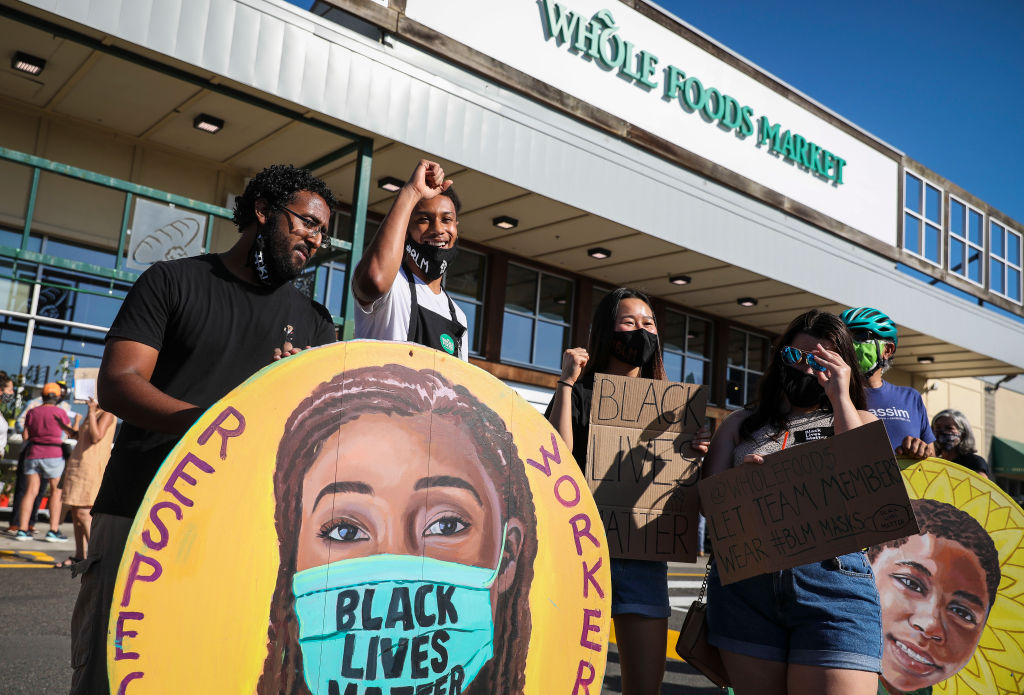
December 22, 2023
Judge Rules Whole Foods’ Black Lives Matter Apparel Ban Lawful
Whole Food employees across the country were often seen wearing buttons, pins, and predominantly face masks with BLM messaging.
A National Labor Relations Board (NLRB) judge ruled that grocery conglomerate Whole Foods had every right to ban employees from wearing Black Lives Matter apparel.
At the height of the BLM movement in May 2020, Whole Foods employees across the country were often seen wearing buttons, pins, and face masks with BLM messaging. The store informed team members that they were violating the dress code and would have two options–clock out and go home or remove the items and continue their shift. Members who chose to go home in stores located in Bedford, New Hampshire, Maryland, Indiana, Massachusetts, New Jersey, Virginia, Georgia, Washington, and more–received numerous violation “points” against them, causing some employees to be “discharged,” defined by Whole Foods as resignations.
Subjected team members filed a complaint with NLRB arguing that a ban on racial justice verbiage violated their protected right to advocate for a better workplace together, according to HuffPost. On Dec. 20, Administrative Law Judge Ariel Sotolongo wasn’t buying it, ruling their solidarity had nothing to do with a goal related to their working conditions at the store.
“In many instances, employees started donning BLM messaging by wearing masks, pins, or jewelry, after learning that employees in other stores were doing so — and in response to learning that employees were being told by the store that they could not do so,” Sotolongo wrote in the ruling.
The judge pointed out that the case wasn’t about dress code or employee actions but if the conduct was protected under Section 7 of the National Labor Relations, which “protects the rights of employees to wear and distribute items such as buttons, pins, stickers, t-shirts, flyers, or other items displaying a message relating to terms and conditions of employment, unionization, and other protected matters.”
Some employees labeled Whole Foods’ rule as racist or insensitive toward African Americans. However, Sotolongo made it clear that wasn’t the case. “The fact that BLM may be a movement of great significance to African Americans, and that its goals are valid, does not mean that a rule prohibiting the displaying of such message at work is ‘racist,’ as some employees implied,” the ruling declared. “The evidence persuades me that the employer was merely trying to avoid controversy and conflict at its stores, which it believed BLM messaging would invite.”
Whole Foods allowed and encouraged messaging in support of the LGBTQ rights movement, and the judge ruled that doesn’t mean a separate crackdown on BLM wear was racially motivated.
Representing the Whole Foods Workers, attorney Shannon Liss-Riordan said in a statement that she is disappointed but has other plans in place. “We are disappointed in this decision. Unfortunately, the ALJ did not take note of the charging parties’ argument that the workers were protesting Whole Foods’ negative response to their concerted activity,” she said.
There was a bright side for the employees as Sotolongo ruled that the store’s ban against messaging on clothing went too far–saying it would limit workers from wearing union pins and other paraphernalia tied to work. General counsel could appeal the ruling to the Washington, D.C. board, who could decide that wearing Black Lives Matter messaging is protected under the law.
RELATED CONTENT: GOP Lawmakers Urge D.C. Mayor To Rename Black Lives Matter Plaza